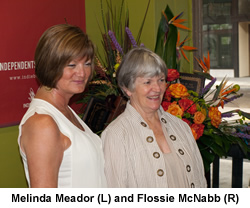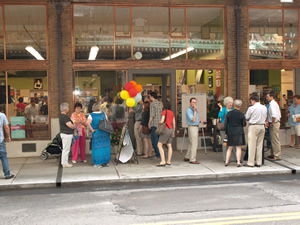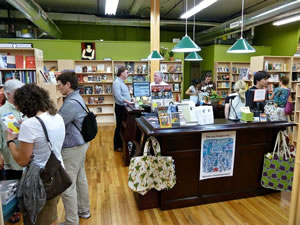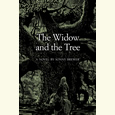Union Sympathizers
Knoxville readers are overjoyed about their new downtown bookstore, Union Ave. Books
Downtown Knoxville finally has something that Knoxville readers have dreamed of for a long time: a really good independent bookstore. Union Ave. Books fills very nicely the void left by Carpe Librum Booksellers, Knoxville’s only indie, which folded last year. Flossie McNabb, one of Carpe’s former owners, has partnered with attorney Melinda Meador to launch the store, which had its grand opening last weekend. As Knoxville Metro Pulse editor Jack Neely told Chapter 16, “Any city that calls itself a city needs an independent bookstore. It makes for a different destination than just bars, restaurants, and clothing stores. It’s the type of business that drives curiosity.”
 With the help of McNabb’s daughter Bunnie Presswood, the new store’s office manager, and Meador’s son Jake Knanishu, content and marketing consultant, the pair have created a vibrant space in the old Daylight Building. The block-long building—which, except for a barbershop, sat empty for decades after TVA moved out—was given a facelift last year by local developer and community activist David Dewhirst and is now on the National Register of Historic Places. Union Ave. Books is the centerpiece of the fully occupied building, flanked on one side by The Happy Envelope stationery shop and Reruns consignment boutique, and on the other by Just Ripe organic deli and John Black Photography.
With the help of McNabb’s daughter Bunnie Presswood, the new store’s office manager, and Meador’s son Jake Knanishu, content and marketing consultant, the pair have created a vibrant space in the old Daylight Building. The block-long building—which, except for a barbershop, sat empty for decades after TVA moved out—was given a facelift last year by local developer and community activist David Dewhirst and is now on the National Register of Historic Places. Union Ave. Books is the centerpiece of the fully occupied building, flanked on one side by The Happy Envelope stationery shop and Reruns consignment boutique, and on the other by Just Ripe organic deli and John Black Photography.
McNabb is optimistic about UAB’s chances, despite the sadness that came with closing Carpe Librum in December. For one thing, the new store will have a magic ingredient, foot traffic, that Carpe lacked out in the Bearden ‘burbs. The store’s smaller footprint will make keeping it fully stocked more economical, as well: “It was hard to keep Carpe Librum looking full and make a profit,” McNabb said in a recent interview in the Knoxville News Sentinel. Finally, the mix of new and used titles will give bibliophiliacs greater spending flexibility. “The shelves aren’t fully stocked yet,” said McNabb, “but books are coming in every day.”
But the best of Carpe will continue at Union Ave. Books: children’s activities, author events, live music, and group meet-ups. Author Pamela Schoenewaldt, who recently gave a reading at the store from her new novel When We Were Strangers, said of UAB: “Here is a small, clean, well-lighted store, run by big-hearted lovers of books that will feel like home to readers, writers, and those who treasure a re-awakening downtown Knoxville.”
“It feels like home” is what many customers said at the grand opening on June 18, as well. Some old Carpe fans were dubious, but once inside they were taken by the good vibes of the Union Avenue space. Even though the new store occupies less square footage than Carpe did, other features more than compensate: beautiful old wood floors, high ceilings, street activity, and fabulous lighting. Knoxville was reminded, after years of grime and paint were removed, that the Daylight was given its name for a reason—not only for its large windows but also for the bright copper framing them and the opaque glass edging the canopy which extends the length of the building.
 Poet Linda Parsons Marion, who read from her new collection, Bound, on June 19, gave poetic praise for that light in a recent email: “Union Ave. Books is coming along at just the right time, in just the right place. With its high ceilings and creaking floors, located in the old Daylight Building, Flossie McNabb has opened her doors to a light we still seek, a room we’ll gather in to share our love and longing for the written word. In our digital world of easy clicks and hurried obsolescence, this new independent bookstore is just the spot to visit, to give ourselves and those we love the gift of words again.”
Poet Linda Parsons Marion, who read from her new collection, Bound, on June 19, gave poetic praise for that light in a recent email: “Union Ave. Books is coming along at just the right time, in just the right place. With its high ceilings and creaking floors, located in the old Daylight Building, Flossie McNabb has opened her doors to a light we still seek, a room we’ll gather in to share our love and longing for the written word. In our digital world of easy clicks and hurried obsolescence, this new independent bookstore is just the spot to visit, to give ourselves and those we love the gift of words again.”
Other Knoxville authors share this view. In fact, the University of Tennessee Press hosted a reception to celebrate local authors at UAB on June 17, and many were on hand to raise a toast. Poet Marilyn Kallet called the space “exhilarating” and remarked that it was “amazing to see so many writers in one room.” Tom Post, publicist for UT Press, said he was thrilled to see a place that would welcome all authors, even academic authors who sometimes have a hard time finding signing venues.
Novelist David Madden, who grew up in Knoxville during the 1930s and ’40s and included much of that adolescent experience in his novel Bijou, was especially glad to see UAB, which he views as a sign of resurgence in the intellectual life of downtown. Madden remembers coming downtown on a Saturday in the mid-‘40s, when he was twelve or thirteen ,and making his weekly “pilgrimage” to all the book dealers from one end of Gay Street to the other. “There were at least four bookshops then,” he said. “In addition, the two big department stores, Miller’s and George’s, had great lending libraries.” He said he still has all the books he bought then, including the copy of Ulysses his grandmother gave him one Christmas.
UAB also carries the usual reader/writer paraphernalia: pens, Moleskin journals, notecards, tote bags. They will also have rotating displays of local art for sale. Bibliopurists may grumble about the sideline items, but in these tough economic times, it’s hard for any retailer to survive without a diverse inventory. This is nothing new for bookstores, of course; George Orwell, in his essay “Bookshop Memories,” gives a delightful description of inventory diversity at the Hampstead bookshop he worked in during the early thirties:
 We sold second-hand typewriters, for instance, and also stamps—used stamps, I mean. Stamp-collectors are a strange, silent, fish-like breed, of all ages, but only of the male sex; women, apparently, fail to see the peculiar charm of gumming bits of coloured paper into albums. We also sold sixpenny horoscopes compiled by somebody who claimed to have foretold the Japanese earthquake. They were in sealed envelopes and I never opened one of them myself, but the people who bought them often came back and told us how “true” their horoscopes had been. … At Christmas time we spent a feverish ten days struggling with Christmas cards and calendars, which are tiresome things to sell but good business while the season lasts. The touts from the Christmas card firms used to come round with their catalogues as early as June. A phrase from one of their invoices sticks in my memory. It was: “2 doz. Infant Jesus with rabbits.”
We sold second-hand typewriters, for instance, and also stamps—used stamps, I mean. Stamp-collectors are a strange, silent, fish-like breed, of all ages, but only of the male sex; women, apparently, fail to see the peculiar charm of gumming bits of coloured paper into albums. We also sold sixpenny horoscopes compiled by somebody who claimed to have foretold the Japanese earthquake. They were in sealed envelopes and I never opened one of them myself, but the people who bought them often came back and told us how “true” their horoscopes had been. … At Christmas time we spent a feverish ten days struggling with Christmas cards and calendars, which are tiresome things to sell but good business while the season lasts. The touts from the Christmas card firms used to come round with their catalogues as early as June. A phrase from one of their invoices sticks in my memory. It was: “2 doz. Infant Jesus with rabbits.”
Flossie McNabb will likely wish she only had ten days in which to struggle with Christmas gift-wrapping.
Actually, she’s happy to gift-wrap any book for free throughout the year. Other services UAB will be offering include special orders, used-book credit, an emailed newsletter with upcoming events and staff recommendations, curbside pickup, and delivery within the surrounding area. The store’s website should be up shortly. “We are gratified by the response,” said McNabb. “Our focus will be community, supporting and enjoying a collaborative relationship with local businesses.”
For the past seven years, I have lived in a condo across the street from the dilapidated Daylight Building and never imagined that one day I would walk out the front door and see such a vibrant street scene with a bookstore at its center. So many bookstores have closed in the past few years; this is like having a new baby in the family after attending a series of funerals. As a book lover, it renews my sense of hope for the world; it changes everything.


